
-
 Attack-minded Spurs boss Postecoglou says: 'You'll miss me when I'm gone'
Attack-minded Spurs boss Postecoglou says: 'You'll miss me when I'm gone'
-
Syria jihadists, allies shell major city Aleppo in shock offensive

-
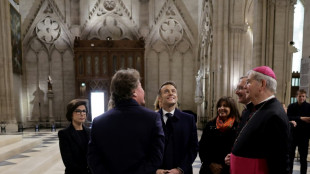 Macron inspects 'sublime' Notre Dame after reconstruction
Macron inspects 'sublime' Notre Dame after reconstruction
-
Arsenal must be near-perfect to catch Liverpool, says Arteta

-
 Arrests, intimidation stoke fear in Pakistan's politics
Arrests, intimidation stoke fear in Pakistan's politics
-
Showdown looms on plastic treaty days before deadline
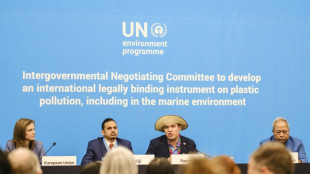
-
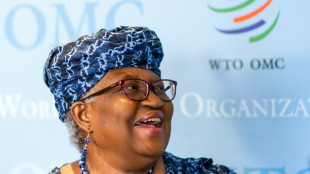 Ngozi Okonjo-Iweala: the WTO's trailblazing motivator
Ngozi Okonjo-Iweala: the WTO's trailblazing motivator
-
WTO chief reappointed as Trump threat looms

-
 US landmine offer to Ukraine throws treaty into 'crisis': campaign group
US landmine offer to Ukraine throws treaty into 'crisis': campaign group
-
British MPs debate contentious assisted dying law

-
 Macron offers first glimpse of post-fire Notre Dame
Macron offers first glimpse of post-fire Notre Dame
-
Syria jihadists, allies shell Aleppo in shock offensive

-
 Japan government approves $92 bn extra budget
Japan government approves $92 bn extra budget
-
Toll in Syria jihadist-army fighting rises to 242: monitor

-
 UK transport secretary quits in setback for Starmer
UK transport secretary quits in setback for Starmer
-
Days before deadline, plastic treaty draft highlights disagreement
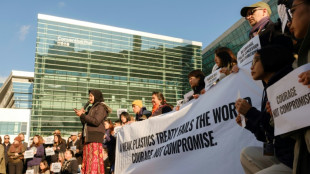
-
 Crypto boss eats banana art he bought for $6.2 million
Crypto boss eats banana art he bought for $6.2 million
-
Teen news boss criticises Australian social media ban

-
 Taiwan detects 41 Chinese military aircraft, ships ahead of Lai US stopover
Taiwan detects 41 Chinese military aircraft, ships ahead of Lai US stopover
-
Spain urged to 'build differently' after deadly floods

-
 WTO chief faces heavy task as Trump threat looms
WTO chief faces heavy task as Trump threat looms
-
Herbert takes control at Australian Open as Smith tanks

-
 Israel PM again warns Iran after top diplomat talks of revising nuclear doctrine
Israel PM again warns Iran after top diplomat talks of revising nuclear doctrine
-
Brilliant Brook's 132 puts England on top against sloppy New Zealand

-
 Brilliant Brook's 132 puts England on top against New Zealand
Brilliant Brook's 132 puts England on top against New Zealand
-
US landmine offer to Ukraine throws global treaty into 'crisis': campaign group

-
 Singapore hangs 4th person in three weeks
Singapore hangs 4th person in three weeks
-
Five things to know about NewJeans' shock split from agency
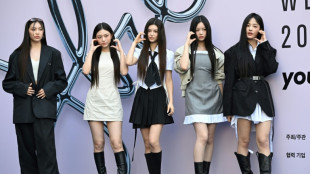
-
 Waste pickers battle for recognition at plastic treaty talks
Waste pickers battle for recognition at plastic treaty talks
-
Ireland votes in closely fought general election

-
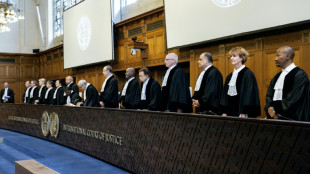 Top UN court to open unprecedented climate hearings
Top UN court to open unprecedented climate hearings
-
European countries that allow assisted dying

-
 British MPs to debate contentious assisted dying law
British MPs to debate contentious assisted dying law
-
Schmidt not expecting hero's welcome on Ireland return

-
 PSG stuck between domestic dominance and Champions League woes
PSG stuck between domestic dominance and Champions League woes
-
'Hot fight' as unbeaten Bayern visit Dortmund fortress

-
 Bordeaux-Begles' Samu 'not finished yet' with Wallabies
Bordeaux-Begles' Samu 'not finished yet' with Wallabies
-
Brook and Pope half-centuries haul England to 174-4 against NZ

-
 Yen rallies on rate hike bets as equity markets swing
Yen rallies on rate hike bets as equity markets swing
-
Ukraine superstar Mahuchikh brings 'good vibes' to her war-torn country

-
 PlayStation at 30: How Sony's grey box conquered gaming
PlayStation at 30: How Sony's grey box conquered gaming
-
Saudi Arabia hosts UN talks on drought, desertification

-
 PlayStation: Fun facts to know as Sony's console turns 30
PlayStation: Fun facts to know as Sony's console turns 30
-
Nepal's first transgender candidates run for local office

-
 Father of PlayStation says 'everyone told us we would fail'
Father of PlayStation says 'everyone told us we would fail'
-
Ireland seek to overcome former coach Schmidt's Wallabies

-
 Detroit survive Bears comeback to make it 10 wins in a row
Detroit survive Bears comeback to make it 10 wins in a row
-
Mexican actor Silvia Pinal dead at 93

-
 'Black Friday' deals target inflation-weary US consumers
'Black Friday' deals target inflation-weary US consumers
-
Liverpool look to deepen Man City crisis, Amorim seeks first Premier League win


UN rights council credibility at stake over China, Russia response
Faced with allegations of grave violations in China and Russia, the UN body created to address rights abuses seems paralysed by uncertainty on how to respond.
The UN Human Rights Council, which will host a month-long session in Geneva from Monday, frequently acts to investigate and rein in abuses inside countries.
But that task is trickier and more fraught when the countries involved are among the world's most powerful, and permanent members of the UN Security Council.
Human rights council members have long shied away from taking on the two heavyweights directly, but a damning United Nations report on violations in China's Xinjiang region and concerns over an intensifying crackdown inside Russia have spurred calls for action.
Yet fears abound that a failed attempt to hold either country accountable would signal a shifting power balance and weaken the council.
"The way the council builds its response will influence its capacity to address the most serious situations in the years to come," a European diplomat told AFP.
"What is at stake is the vision of the universality of human rights, the vision of the role of the human rights council."
- New world order? -
China is facing intense scrutiny after former UN rights chief Michelle Bachelet released her long-delayed Xinjiang report last week, warning of possible crimes against humanity.
The report brought the UN seal to allegations by campaigners and others of a litany of abuses in Xinjiang, where they say more than one million Uyghurs and other Muslims have been detained.
Beijing has vehemently rejected such charges and criticised the report, accusing the UN of becoming a "thug and accomplice of the US and the West".
Bachelet's newly-appointed successor, Volker Turk of Austria, will face the tricky follow-up job, but the report also hints the rights council should address the issue.
Amid frenzied diplomatic consultations, there appears to be agreement that doing nothing is not an option.
"If a majority of countries on the Human Rights Council decide not to take action in a situation as serious as the one described in Mrs Bachelet's report, that would mean that we are in another world order," the European diplomat said.
There have been calls for an urgent council debate on Xinjiang, or a resolution denouncing the abuses or even requesting the appointment of an expert to probe the situation.
- 'Cost of inaction' -
"Governments should waste no time establishing an independent investigation," John Fisher of Human Rights Watch said.
At the same time, Western countries and their allies are wary of the impact if they fail to garner enough votes to pass a resolution in the 47-member-council.
"There is a cost of inaction, and a cost of a failed attempt to act," a Western diplomat said.
China has been energetically lobbying countries behind the scenes to "pre-emptively" counter any moves, observers say.
"We are strongly opposed to any politically-motivated exercise," Chinese ambassador Chen Xu told reporters Friday.
"We are ready to conduct business in a constructive way, but if anybody launches joint actions against us, we have to be fully prepared."
It remains unclear how the votes would land, and observers say Western countries might postpone presenting a resolution until they know the support is there.
"We need to look very closely at whether we have a majority or not", the European diplomat said.
The same goes for Russia.
Earlier this year, the council ordered a high-level probe of violations by Russian troops in Ukraine.
But there has been growing pressure for the body to also turn its gaze on rights abuses inside of Russia.
Rights groups have urged European Union countries to lead on a resolution to appoint an independent expert known as a Special Rapporteur to examine the situation, but a decision has yet to be taken.
"Everyone agrees there is a need... but what we haven't agreed on is timing," the Western diplomat said.
Despite being kicked off the council earlier this year over its war in Ukraine, "Russia does not lack support," the European diplomat said.
"One has to keep that in mind... The impact of a defeated resolution would be felt for a long time."
O.Lorenz--BTB
